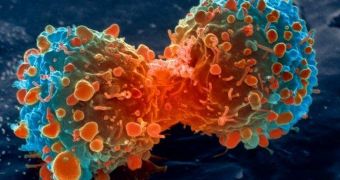A recent paper in the journal Nature Chemistry documents the development of molecules whose behavior is similar to that of compounds naturally occurring in the body and that researchers say could help fight cancer.
This research project was spearheaded by Professor Peter Scott with the University of Warwick in the UK, who worked closely with specialist Roger Phillips at the Institute for Cancer Therapeutics in Bradford and other chemists.
Writing in the journal Nature Chemistry, the scientists behind this investigation detail that the compounds whose behavior their man-made molecules mimic are known to the scientific community as peptides.
The human body produces peptides, defined as naturally occurring biological molecules, when attempting to fight infection and cancer. Hence, efforts are now being made to create peptide-like compounds in laboratory conditions.
The end goal is to use such artificial molecules whose structure and working agenda resemble those of peptides in order to boost the human body's ability to fight cancer. These man-made molecules could potentially serve to treat said condition.
According to the Alpha Galileo Foundation, the artificial peptides created by Peter Scott, Roger Phillips and their colleagues are not the first man-made molecules of this kind to have until now been obtained in laboratory conditions.
What makes them stand out is the fact that, unlike their predecessors, the process that enabled the scientists to create them was not all that complicated. Besides, evidence indicates that it could be replicated on a larger scale without too much difficulty.
“The chemistry involved is like throwing Lego blocks into a bag, giving them a shake, and finding that you made a model of the Death Star. There are no complicated separations to do, and unlike a Lego model kit there are no mysterious bits left over,” says Professor Peter Scott.
“The beauty is that these big molecules assemble themselves. Nature uses this kind of self-assembly to make complex asymmetric molecules like proteins all the time, but doing it artificially is a major challenge,” the specialist goes on to explain.
The molecules have until now been tested on colon cancer cells during a series of laboratory tests. Peter Scott and fellow researchers say that they proved surprisingly effective in attacking these cells, and that evidence indicates that they could one day serve to treat cancer.
Still, it will probably be a while until clinical trials involving human patients are rolled out. Thus, the researchers say that further investigations are needed in order to figure out how these artificial peptides will behave when introduced in the body of one individual or another.

 14 DAY TRIAL //
14 DAY TRIAL //